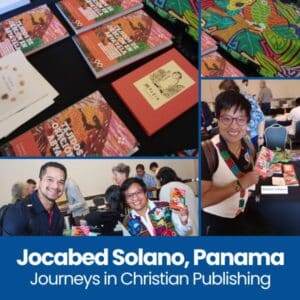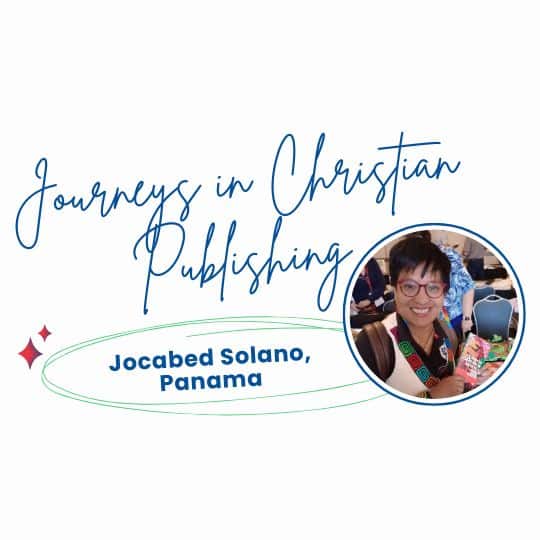In indigenous communities across Latin America, there are few books written by local Christians in their own voices. Jocabed Solano wants to change that. “We want to compile, record, to write memories and histories, in the voices of indigenous people,” Jocabed says. “It’s so important to listen to indigenous people in their voices. They have a lot of important things to say about what the Holy Spirit is doing in their communities.” This story is part of the Journeys in Christian Publishing: Stories from LittWorld series.
We’d love to know more about you and your ministry. What are you up to in Panama?
I serve with an indigenous Christian organization, Memoria Indígena, working with indigenous communities in Latin America. We want to compile, record, to write memories and histories, in the voices of indigenous people. How do indigenous people understand Christianity? We want to be a part of the community, and to continue to encourage the indigenous church.
In libraries, we cannot see a lot of books about indigenous perspectives, written in their own voices. We follow Jesus. He loves to be in the vulnerable communities and we want to share what the Holy Spirit is doing in these communities.
When we’re thinking about the presence of God in indigenous communities, we can see a lot of value and beauty. Indigenous people understand the importance of holistic, integral mission. It’s complementary and involves both receiving and giving. That’s so important.
In what ways have books played a part in your faith journey, and is that in any way connected with how God led you into this ministry?
When I was a child, my father and mother were missionaries working with my people. The Bible was the first book I heard, because my parents wanted my sister and I to have a very close relationship with God. They also bought a lot of Christian books for me. These books helped me to understand my relationship with God better. I might not have known these authors in person, but through their theological books or testimonies, I could better understand the Christian life.

In my community, when we want to hear different memories, we sing songs about the importance of our relationship with our Creator. Oral books and oral texts are important to our identity and our Christian faith. My people, the Gunadule people, sing a lot of songs. One is about the relationship between our Creator and creation.
These two experiences come together to form us as a Christian people, and me as a Christian woman, today.
How did you move from this passion to doing the work that you’re doing?
When I was a youth, when my friends and I went to the library we didn’t see many books about indigenous people. We couldn’t see a lot of memories about indigenous Christians, and today, we still cannot see that at all. We see this as an opportunity.
I was working with IFES, and as I finished my work I was praying with other friends, asking God, “How can we serve our communities better?” God called us to work with them, work with my people—because I am indigenous too—and to understand the Holy Spirit is doing something special with indigenous people.
So we created a community with indigenous people from Bolivia, Columbia, Ibara and others! We prayed to God because we want to serve our community in Latin America. God called us to encourage our people to write their history about Christianity in indigenous writing, in their voices. The first book we worked on together is about prayer points, songs and Bible stories in indigenous teams.
What are some of the current projects you’re working on?
We’re doing work with several indigenous communities in countries like Bolivia, Guatemala, Panama, Costa Rica, Chile, Brazil, Peru and others. We’re working on compiling memories from these communities on our website, as well as three books. One of these books is a project with indigenous women who are reading the Bible and praying as a community, and now are writing their experience and Bible stories.
We’re also working on a small book with reflections on Revelation 7:9-12, where all nations are in front of the Lamb of God. We have many arts in indigenous communities. For us, art is a way of communication, a big mural, a tapestry. The indigenous women writing this book are so smart, and they can fertilize our faith to understand other perspectives about Jesus.
Another book we are doing is about the experience of indigenous women in local churches. We are working with indigenous authors who are writing about discipleship, mission, theology and ecclesiology. What does discipleship like in our context? For example, did you know indigenous communities struggle with climate change and the loss of biodiversity when big companies want to displace indigenous people? And the question for them is: how can we follow Jesus in this kind of reality? Many churches in our context don’t have a book about discipleship for indigenous people in their language that reflect their realities. Today, they are making their own books, and we want to encourage them to keep doing that as a Christian people in their context.
What advice would you give other indigenous communities who are looking to start a similar ministry?
The Holy Spirit wants to continue doing special things with indigenous people. One thing I’d say is that as a global Church, we can better understand better the concept of reciprocity. Reciprocity is not only when we work in indigenous communities and say, “I’m going to give money.” That is OK, but it’s more than this. It’s how we fertilize our global Church with intercultural theology, which talks about the beauty of the whole Body of Christ. What might this look like? It’s so important to listen to indigenous people in their voices. They have a lot of important things to say about what the Holy Spirit is doing in their communities, and their testimony is a witness of what Jesus is doing these days in our contexts.
The important thing about listening is to learn. We can learn from indigenous people. We can ask how the Holy Spirit is already working, and how can I learn as a missionary first, asking ourselves, “How can we learn from them?” rather than, “How can I teach them?” That’s important because it’s humility. Jesus sets us this example to be humble. Let’s recognize that the Holy Spirit is working in indigenous contexts. The Holy Spirit is working in many people, and one of them is indigenous people.
How might we pray for you and your ministry?
Prayer for us is so important. Pray for wisdom to continue working with indigenous communities, for resources to continue to encourage our people to write, record and make art about indigenous Christian memories. That’s important because I believe we can invite other young people to work together and to maintain our memory as a Christian people. This is a powerful witness about Jesus and what the Holy Spirit is doing in our context. My prayer is that more memories are going to be shared with the global Church and you can see the work of the Holy Spirit in indigenous churches and communities.

